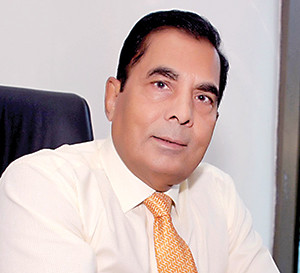
Dr N K Pandey, Chairman & Managing Director, Asian Institute of Medical Sciences, Faridabad talks about the need for more transparency in the imported hospital equipment in conversation with Romiya Das of Elets News Network (ENN)
How do you see the Indian healthcare infrastructure in compared to global infrastructure?

Indian healthcare infrastructure is still at a nascent stage. Our expenditure on healthcare is poor. India currently spends approximately 4.2 per cent of its GDP on healthcare, with just one per cent being contributed by the public sector, amongst the lowest globally. We stand in league with Bangladesh, Uganda and other African countries and are not even at par with other developing countries. Presently, the basic problem is that the good quality healthcare is restricted to big towns. To create a better healthcare infrastructure we need to focus at district level, providing secondary level hospitals, and the big players should also move from metropolitan cities to tier II, III and IV cities. There is a need of a basic infrastructure “ may be 50 to 100 bedded hospital facility with at least secondary care and for rest the super specialty care the patients can look for bigger setups in the metropolitan cities.
Further, even in the smaller regions or cities the land price has escalated. Most of the medical colleges are moving towards the rural areas due as the land price subsides. The government needs to help the people who have got the will to take healthcare infrastructure to the next level. A single window is required in order to accelerate the infrastructural development
What does the Indian Healthcare Infrastructure lacks?

Healthcare, in India, is traditionally seen as a social sector, with less government focus and low budget allocation. The healthcare sector in the country is in urgent need to get the right policy framework and infrastructure impetus. Granting infrastructure status may not only help the sector receive investments, but also bring down the cost of healthcare delivery. Further in India, we have a fragmented industry with multiplication of resources. For instance purchase of expensive equipment. If I buy one the second and third hospital will buy the same. Whereas in overseas they look into the demand and they create a regional centre and everything will be referred there. So, splitting of resources doesn’t happen and if the resource is created it is utilised by everybody. Our manufacturing of medical equipment is at very basic level. The most what we are doing is importing things from China and assembling it with no quality. We have not grown beyond that. If we look at any big equipment, we are depended on major manufacturers who are manufacturing outside and we have no control on their cost input. The government should bring more transparency in the imported hospital equipment so that the common man is less burdened.
What are the regulations required to build a robust infrastructure?
There is a need to deregulate than to regulate. What needs to be regulated is the patient safety. This can be achieved by bringing in standard of care such as monitoring pollution levels, looking at various compliances etc. The new private players are setting up infrastructure meeting NABH standards. Further, beyond just doing accreditation what is required is to segregate the basket “ as all accredited hospitals fall in one basket, scaling their forte at various levels that differentiation need to be brought in.
What are your hospitals expansion plans?
We had a major investment from American PE firm a year and half ago. Thereafter, we have commissioned a basic tertiary care hospital in East Delhi and are in process of commissioning 200-bedded tertiary care hospital in Moradabad. As we are maxed out on the capacity in our present location, we are planning for a 100-bedded secondary care facility in Greater Faridabad and Palwal. We are in the process of getting all the approvals in place and the construction is likely to start within 3-4 months. We are also exploring multiple growth opportunities in states like Bihar, Jharkhand, Madhya Pradesh and Jammu & Kashmir. To augment these growth plans, we would be approaching the market soon for second round of funding.
Be a part of Elets Collaborative Initiatives. Join Us for Upcoming Events and explore business opportunities. Like us on Facebook , connect with us on LinkedIn and follow us on Twitter , Instagram.













